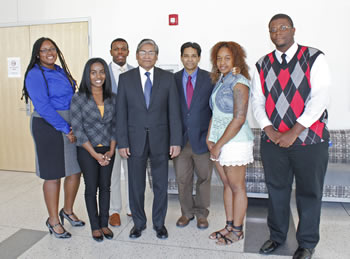Students say you must be open minded to enjoy travel abroad

Kesha Williams
9/1/15
Traveling to India for an eight-week Summer Cultural Immersion Experience was an extraordinary assignment three ECSU students will long remember.
Daniel Nobles, Dwayne Ponton, and Kiana Rivers took the trip that was funded by the Mid-Atlantic Consortium Center of Academic Excellence (MAC-CAE). The consortium is a four-year-old workforce development effort that emphasizes study of Southeast Asia. Four universities participate in this consortium —- Elizabeth City State University, Morgan State University, Bowie State University and Norfolk State University. Each year, students from ECSU have the option of studying in Bangladesh or India for eight weeks to supplement the instruction offered in their semester courses. The MAC-CAE program draws students who have an interest in national security, cybersecurity and intelligence studies. As of 2015, 10 ECSU students have participated in the classes where they learn Hindi, the language of India.
After hearing positive comments from other college students who’ve completed the program in India, Nobles, Ponton and Rivers began planning their trip. While India is witnessing rapid economic growth, the country is still struggling with various social and health issues. Back in June, the students were fortunate to meet and hear a speech by Bangladesh’s Ambassador to the U.S., Mohammed Ziauddin. During the speech, he encouraged ECSU students to learn more about Southeast Asia, the challenges of improving social issues, and the importance of trade between the U.S. and those countries.
Nobles said the trip was a good way for him to prepare for a career with Homeland Security and to understand why some countries find it easy or difficult to compete and to exchange goods and services with America. For two days, the three ECSU students and students from other universities stayed in New Delhi, India to learn about norms, customs and appropriate behavioral patterns for visitors. A host family in Jaipur, India– two parents and a daughter– welcomed Nobles and Ponton into their home and invited them to visit local parks. They provided vegetarian meals, which Nobles admitted was an adjustment. He also noticed how India differs from America in their security measures, traffic patterns and public health programs.
“In India, pedestrians do not have the right away so we spent most of our time dodging cars. We held our seatbelts tight [in the car],” Nobles said.
“The wild life there was an amazing experience, but definitely something that took time to get adjusted to. From the sites of homeless people we passed everyday on our way to class to seeing people bathing on the side of the road, it was truly a life changing experience.”
Ponton said a weeklong preparatory program earlier in June successfully outlined the MAC-CAE program for him. Ambassador Ziauddin’s speech, the highpoint of that week, stirred his interest in South Asia. “The best way to successfully live in a place like India is to just forget about everything you know. The American lifestyle is so different [from] India to the point that you will not enjoy your stay if you focus on differences. Being open minded is that best way to successfully enjoy the experience.”
“We learned about the culture, population, economic and political problems throughout the region of South Asia. My experience in India is an experience of a lifetime,” Ponton said. “This made me realize that I don’t have a right to complain about not having something, especially if it is not a need. Because I know that there are people out there who don’t even have half as much as I have or in some cases nothing at all.”

